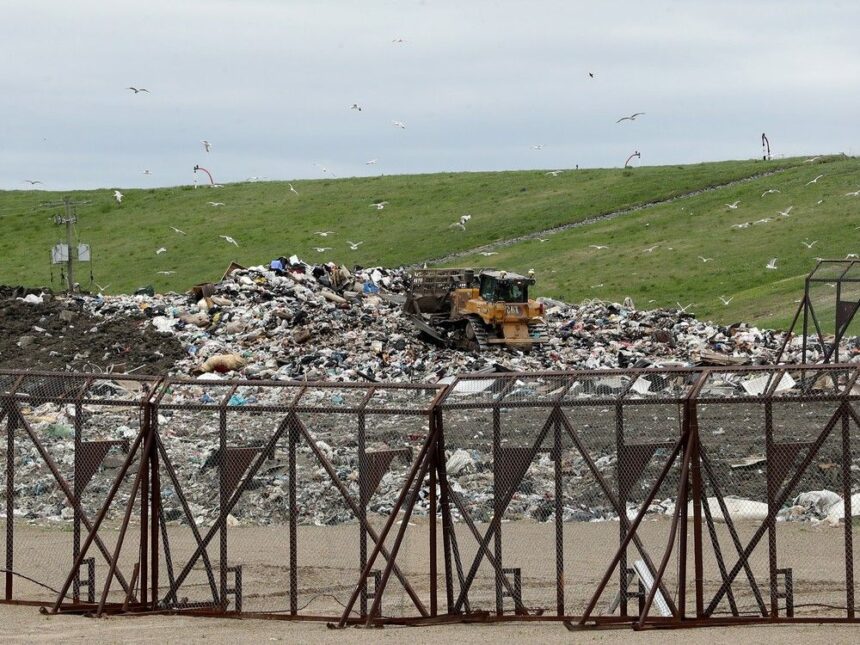As Ottawa’s Trail Road landfill approaches capacity, city officials have taken a decisive step that will fundamentally alter waste management for local businesses. Starting November 1, commercial waste will be banned from the Trail Road facility – a move that signals both a crisis point and a potential turning point for our city’s approach to garbage.
The decision comes as our city’s only municipal landfill faces a critical reality: at current disposal rates, Trail Road will reach its limit by 2036. That’s just 12 years before our community would face the costly prospect of trucking waste to distant facilities or developing new local options.
“We’re essentially buying time,” explains Nichole Antoine, Ottawa’s Acting Director of Solid Waste Services. During our conversation at City Hall yesterday, Antoine outlined how this ban could extend Trail Road’s lifespan by approximately three years – a modest but meaningful extension that gives planners crucial breathing room.
The impact of this decision ripples throughout Ottawa’s business community. Commercial waste currently accounts for roughly 17% of all material entering Trail Road – approximately 40,000 tonnes annually. Local businesses from restaurants to retail operations must now navigate new disposal arrangements with private waste management companies.
Kevin Smith, who owns three coffee shops in Centretown, tells me his waste management costs could increase by 30%. “We’re already operating on thin margins,” Smith explained while sorting recyclables behind his Bank Street location. “This feels like another blow after everything small businesses have endured these past few years.”
The City of Ottawa hasn’t made this decision lightly. The Trail Road landfill, operational since 1980, serves as a sobering reminder of our consumption patterns. Walking the site last week, I was struck by the sheer volume – mountains of waste stretching across 100 hectares, the physical manifestation of what we discard.
For Ecology Ottawa’s Executive Director Alice Thompson, this restriction represents an overdue reckoning. “Ottawa has been complacent about waste for too long,” she argues. “While this ban creates challenges, it also creates opportunities for businesses to reimagine their relationship with materials.”
Thompson points to innovative models emerging across the region – from package-free stores to circular economy initiatives that design out waste entirely. “Forward-thinking businesses will see this not just as a regulatory hurdle, but as a competitive advantage,” she suggests.
The Ottawa Board of Trade has expressed more measured support. “Our members understand the environmental imperative,” notes Board President Sueling Ching, “but implementation timeline concerns remain. Many businesses, particularly smaller operations, need more transition support.”
In response, the city has launched a commercial waste transition program offering guidance and resources to affected businesses. This includes workshops on waste reduction strategies and connections to certified private waste handlers.
Council’s decision follows years of waste management planning and community consultation. The Solid Waste Master Plan, approved in 2022, identified diversion of commercial waste as a key strategy for extending Trail Road’s operational lifespan while reducing environmental impact.
City Councillor Rawlson King, who represents Rideau-Rockcliffe Ward, describes the ban as “necessary but insufficient” on its own. “This buys us time, but Ottawa needs to fundamentally rethink our approach to materials,” he explained during our phone conversation this morning.
King points to successful models in other jurisdictions – like Halifax’s source-separated waste stream and Metro Vancouver’s material ban approach – as potential inspiration for Ottawa’s next steps.
Environmental advocates generally applaud the move but argue more comprehensive action remains necessary. The Ottawa Environmental Network’s waste reduction coordinator, Jean Thompson (no relation), emphasized during our meeting at their downtown office that “banning commercial waste addresses symptoms rather than causes.”
“We need to move upstream,” Thompson argues, “to product design, consumption patterns, and truly circular systems that eliminate waste entirely.”
For everyday Ottawa residents, this commercial ban won’t directly affect curbside collection or residential drop-off at Trail Road. However, the wider conversation about waste that this policy triggers matters for every household.
Ottawa produces approximately 1 tonne of waste per person annually – a figure that’s remained stubbornly consistent despite growing awareness about environmental impacts. This commercial waste ban serves as a stark reminder that our current approach is unsustainable.
As I walked through the Glebe yesterday afternoon, I noticed how many businesses have already begun adapting. At a local grocery store, new signage explains their packaging reduction initiatives. A nearby restaurant advertises their compost partnership with a local urban farm.
These adaptations reflect the innovation that constraints often inspire. While the commercial waste ban creates genuine challenges, particularly for small businesses managing tight budgets, it also catalyzes creativity.
The Trail Road decision represents just one piece of Ottawa’s evolving waste management puzzle. The city continues moving toward a broader strategy that includes increasing residential diversion rates, exploring new processing technologies, and potentially developing waste-to-energy facilities.
For Ottawa businesses and residents alike, the message grows clearer: our waste doesn’t simply disappear when it leaves our hands. As Trail Road approaches its capacity limits, we collectively face a reckoning about consumption, materials, and responsibility.
The commercial waste ban may be today’s headline, but the underlying story – how Ottawa will manage materials in a sustainable, forward-thinking way – will continue unfolding in the years ahead.







